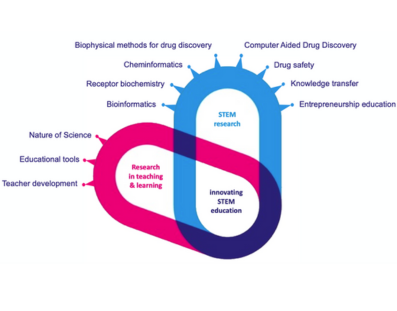At the Innovations in Human Health & Life Sciences (iH2LS) division, we are dedicated to merging scientific theories of education with the context of Science, Technology, Engineering and Mathematics (STEM). Our commitment to understanding how things work drives innovation in both research and teaching practices. Our team of teacher-researchers explores novel teaching concepts and learning methods that foster new insights that enrich various study programs in the Faculty of Science. Our research flourishes from multi-disciplinary collaboration and integration of different knowledge and techniques. The dual focus on understanding STEM teaching and learning as well as performing scientific research, consistently stimulates innovation in both areas.
Below performing and innovating research and teaching processes, the iH2LS group is dedicated to supporting the development of young professionals (e.g. junior lecturers or Ph.D students) within the department of Chemistry & Pharmaceutical Sciences (CPS). Junior lecturers are important assets in educational programs and, similar to a PhD-trajectory, junior lecturers follow a development process. It is our aim to let junior teachers reach and utilize their full potential in teaching, while safeguarding both their development process and well-being.
Within iH2LS, we also host junior lectures from the recently started Mechanical Engineering BSc program, an English-language joint-degree with the University of Twente and the Vrije Universiteit Amsterdam. This program follows the innovative Twente Educational Model, where semester-long projects merge knowledge from parallel content courses, delivering a meaningful and practical learning experience. Emphasizing skill development, each project includes an integrated academic-skills learning line, ensuring students acquire the necessary competencies at the right time.
Research into teaching and learning
Our research at iH2LS explores innovative methods and didactics in STEM education. We actively seek new teaching concepts and innovative learning approaches, with a key focus on active learning. The three research lines covering a spectrum of diverse projects, are:
- Nature of Science
- Educational tools
- Teacher development
When developing novel heuristics for implementing innovative teaching approaches, we keep practicality in mind to ensure they are both feasible and effective. Our students benefit from our continuous efforts to integrate the findings of our educational research into daily teaching practices to enhance student engagement and learning outcomes. Beyond stimulating insightful discussions, we at iH2LS are committed to driving broader changes across the faculty's study programs. An example is the Pharmaceutical Sciences program, which has already adopted various educational innovations in areas such as academic skills, research and lab skills, and active learning. By embedding these learning areas within the interesting context of drug discovery—a field filled with intriguing aspects and numerous unanswered questions—we ignite the enthusiasm and curiosity of science students.
Medicinal chemistry research
The medicinal chemistry research lines at iH2LS focus on elucidating molecular drug targets and the interactions thereof with small molecules. For example, through biophysical methods like surface plasmon resonance (SPR). We employ SPR biosensors and isothermal titration calorimetry (ITC) to analyze protein-ligand interactions and the thermodynamics of ligand binding which help us derive structure-kinetics relationships (SKRs). Coupled with X-ray crystallography, these techniques assist in understanding the molecular intricacies of target binding. But also in other disciplines, like Computer Aided Drug Discovery (CADD), bioinformatics, cheminformatics, receptor biochemistry and drug safety we strive to improve our understanding of the biological targets and their molecular interactions with small molecules.
Another core research area is understanding knowledge transfer processes within the realm of drug discovery. Under the ONCORNET 2.0 project, we are geared up to examine the status of GPCR cancer drug commercialization, by studying the intertwined perspectives of biomolecular sciences, innovation management, and organizational sciences. We study the knowledge base, clinical trials, and patents with the goal of contributing to GPCR cancer research in relation to innovation in pharmaceutical science management.
Click here to return to the department Chemistry and Pharmaceutical Sciences
